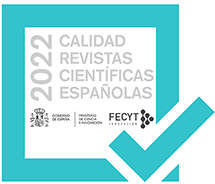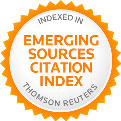Acute maternal exercise during the third trimester of pregnancy, influence on foetal heart rate. (Ejercicio físico durante el tercer trimestre de embarazo, influencia en la frecuencia cardiaca fetal).
Resumen
Abstract
A substantial amount of research has investigated the influence of physical exercise during pregnancy on certain maternal and foetal parameters. Regarding the behaviour of the foetal heart rate (FHR) during the maternal exercise certain controversy exists; as several investigations have studied this parameter obtaining varied results. To test the hypotheses that the foetal heart rate (FHR) increases during maternal exercise, performed on a static bicycle during the third trimester. To know if the magnitude of the increase is related to gestational age or parity. This research involved a collaboration with the Gynaecology and Obstetrics Service of “Severo Ochoa” Hospital (Madrid) and Universidad Politécnica de Madrid (UPM). The approval of the Committee of Investigation as well as of the Ethical Commission of the Hospital was obtained. Twenty healthy pregnant women have been studied, in the last trimester. No women showed any medical complications in their pregnancy or contraindications for the practice of physical exercise. Informed consent was obtained. The exercise protocol consisted in the first part (rest), followed by a session of 20 minutes of moderate work (static bicycle exercise) and then rest until the FHR returned to the pre-exercise levels. Data for the evaluation of the FHR was obtained using an Electronic Foetal Monitor, Philips FM 20; and an Accurex Plus, Polar Electro OY was used for the control of the maternal heart rate. The clinical history of the pregnant women provided data about medical and personal factors. For the statistical analysis, Pearson correlation and Student’s t test for unpaired data were used.
Our results show increases (11 - 36 beats/min, mean= 24 beats/min) of the FHR in all the studied cases. The gestational age shows no correlation with increments of FHR (Pearson 0.06) and there are larger increments of FHR in secundigravid (mean=152 ± 6.0 beats/min) than in primigravid (mean=147 ± 4.6 beats/min). maternal aerobic and moderate exercise developing during last trimester increments FHR without harmful effects. These increments do not depend on the maternal age. Parity has influence on the level of increments of the FHR.
Key words: foetal heart rate, exercise, pregnancy.
Resumen
Una cantidad importante de investigaciones han valorado la influencia del ejercicio físico durante el embarazo en ciertos parámetros fetales. En relación al comportamiento de la frecuencia cardiaca foetal (FCF) durante la realización del ejercicio existe cierta controversia, muchas investigaciones han estudiado este parámetro con resultados variados. Comprobar la hipótesis de un aumento de la FCF durante la realización de ejercicio en bicicleta estática en el tercer trimestre de embarazo. También conocer si esos aumentos se relacionan con la edad gestacional o la paridad de la gestante. Este estudio se ha desarrollado mediante una colaboración entre el Servicio de Ginecología y Obstetricia del Hospital Severo Ochoa de Leganés y la Universidad Politécnica de Madrid. Se obtuvo la aprobación del Comité de Investigación así como de la Comisión Ética. Fueron estudiadas 20 gestantes en el último trimestre, sin complicaciones ni contraindicaciones médicas para el ejercicio, cada mujer firmó un consentimiento informado. El protocolo de ejercicio consistió en una primera parte de reposo, una sesión de 20 minutos de trabajo moderado en bicicleta estática y el reposo final con retorno a los niveles normales de FCF. Los datos correspondientes a la FCF se obtuvieron por medio de un Monitor Foetal Electrónico Philips FM 20, y un pulsómetro Accurex Plus, Polar Electro OY, fue usado para el control de la frecuencia cardíaca materna. La historia clínica de cada gestante aportó datos relativos a características médicas y personales. Para el análisis estadístico se utilizaron mecanismos descriptivos, el índice de correlación de Pearson y la t de Student para comparación de medias.
Nuestros resultados muestran aumentos de la FCF de 11-36 lat/min (media de 24 lat/min). Los días de gestación no presentaron una correlación positiva con el nivel de los incrementos (Pearson 0.06). Hubo mayores aumentos en gestantes secundigrávidas (media=152 ± 6.0 lat/min) que en primigrávidas (media=147 ± 4.6 lat/min). El ejercicio aeróbico y moderado materno desarrollado durante el tercer trimestre de embarazo incrementa la FCF sin efectos perjudiciales. Los aumentos no dependen de la edad gestacional de la madre. La paridad de la gestante tiene influencia en el nivel de los incrementos.
Palabras claves: frecuencia cardiaca fetal, ejercicio, embarazo.
doi:10.5232/ricyde2008.01303
Texto completo en PDF
---------------------------------------------------------------------
References/referencias
ACOG. American College of Obstetricians and Gynecologists. (2002) Exercise during pregnancy and the postpartum period. Committe Opinion Nº 267 . Washington, DC. January. Obstet Gynecol; 99:171-3.
doi:10.1016/S0029-7844(01)01749-5
Artal, R. O’Toole, M. and White, S. (2003) Guidelines of the American College of Obstetrician and Gynecologists for exercise during pregnancy and the postpartum period. Br J Sports Med; 37: 6-12.
doi:10.1136/bjsm.37.1.6
PMid:12547738 PMCid:1724598
Artal, R. Romen, Y. Paul, R. and Wiswell, R. (1984): Foetal bradycardia induced by maternal exercise. Lancet, 2:258-60.
doi:10.1016/S0140-6736(84)90301-5
Avery, N. Stocking, K. Tranmer, J. Davies, G. and Wolfe, L. (1999). Foetal responses to maternal strength conditioning exercises in late gestation. Can J Appl Physiol; 24(4): 362-376.
PMid:10470452
Barakat Carballo, R. Alonso Merino, G. Rodríguez Cabrero, M. y Rojo Gonzalez, J. (2006) El ejercicio físico y los resultados del embarazo. Prog Obstet Ginecol, 49(11):630-8.
doi:10.1016/S0304-5013(06)72664-4
Carpenter, M. Sady, S. Hoergsberg, B. et al. (1988) Foetal heart rate response to maternal exertion. JAMA; 259: 3006-3009.
PMid:11810100
Clapp, JF III. Kim, H. Burciu, B. Schmitd, S. Petry, K. and Lopez B. (2002): Continuing regular exercise during pregnancy: effect of exercise volume on fetoplacental growth. Am J Obstet Gynecol; 186 (1):142-7.
doi:10.1067/mob.2002.119109
PMid:8420327
Gorski J. (1985) Exercise during pregnancy: maternal and foetal responses. A brief review. Med Sci Sports Exerc;17(4): 407-16.
doi:10.1249/00005768-198508000-00001
Macphail, A. and Wolfe L. (2000) Maximal exercise testing in late gestation: foetal responses. Obstet Gynecol;96: 565-70.
doi:10.1016/S0029-7844(00)00940-6
McMurray, R. Mottola, M. Wolfe, L. Artal, R. Millar, L and Pivarnik, J. (1993) Recent advances in understanding maternal an foetal responses to exercise. Med Sci Sports Exerc; 25(12): 1305-21.
doi:10.1249/00005768-199312000-00001
PMid:1623357 PMCid:1478918
O’Neill, M. Cooper, B. Mills, C. Boyce, E. and Hunyor, S. (1992) Accuracy of Borg’s rating of perceived exertion in the prediction of heart rates during pregnancy. Br J Sports Med; 26(2): 121-124.
doi:10.1136/bjsm.26.2.121
PMid:10693607
Riemann, M. and Kanstrup Hansen, L. (2000) Effects on the foetus of exercise in pregnancy. Scand J Med Sci Sports; (10): 12-19.
doi:10.1034/j.1600-0838.2000.010001012.x
PMid:1550154
Van Doorn, M. Lotgering, F. Struijk, P. Jan Pool, B. and Wallenburg, H. (1992) Maternal and foetal cardiovascular responses to strenuous bicycle exercise. Am J Obstet Gynecol; 166: 854-9.
PMid:8513287
Wolfe, L. and Weissgerberg, T. (2003) Clinical physiology of exercise in pregnancy: a literature review. J Obstet Gynaecol Can; 25(6): 451-3.
PMid:7925542
Wolfe, L. Brenner, I. and Mottola, M. (1994) Maternal exercise, foetal well- being and pregnancy outcome. Exerc Sport Sci Rev; 22: 145-94.
doi:10.1249/00003677-199401000-00008
PMid:3285041
---------------------------------------------------------------------
Palabras clave/key words
Texto completo/Full Text:
PDF------------------------ 0 -------------------------
RICYDE. Revista Internacional de Ciencias del Deporte
![]()

Publisher: Ramón Cantó Alcaraz
ISSN:1885-3137 - Periodicidad Trimestral / Quarterly

